Article on Facebook by Helen Nathaniel-fulton
Aliens Invade!
So, as an ordinary Welsh person, a small farmer say, trader, labourer or bonded labourer, how would you have felt & fared when Normans invaded SW Wales & created the Lordship of Gower?
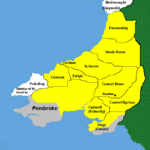
You were used to living under the rule of a Welsh Prince. Deheubarth especially had claimed Gower from 9th century on, but other princes coveted & fought over it. The fighting though was mostly in the area north of where Swanzey was later founded.
Gower wasn’t untouched by violence: Einion of Deheubarth was angry others had taken Gower & raided it violently, laying it waste.
Imagine the horror of that for the people – so dependent on their crops, there was famine afterwards as well as terror, deaths, casualties. This deed led to the well known 970 battle at Cadle.
Who your lord was would be vital to your well being: living on small settlements or farms you were dependent on him & a part of his kinship network or Tud & you had a fixed rank, your Braint. You’d be happy to have a strong prince like Hywel Dda to protect you, bring stability.
You would have felt you belonged in your society, knowing exactly who & what you were, what was expected of everyone. Despite conflicts between rulers, the wider population shared a common language, legal, cultural & religious traditions – though naturally there were local variations.
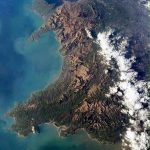
The English had called your country ‘Wallia’, the land of ‘Walas’, foreigners, & it stuck, though your word for your country was Cymru. By now people between the old Saxon Dyke & Irish Sea thought of themselves as living in Cymru or Wales, as Cymro or Welsh.
You lived under Welsh Law – administered locally at commote courts or at the lord’s court – believed to have first been written down in the reign of the great King Hywel Dda.
Notable features were inheritance of land by male descendants only, legitimate or illegitimate (gavelkind); a system of blood feud payments (galanas); legal slavery & bonded labour or serfdom; foreigners unable to naturalise earlier than the 4th generation; easy divorce & acceptance of illegitimacy that would horrify the Norman clergy.
The lord had his HQ/court, warriors, administrators, servants & bonded labourers on his farms. He too however had to respect the laws. No early Welsh courts survive but below are pictured the visible 13th century stone remains of Prince Llywelyn ap Gruffudd’s court on Anglesey.
As well as farming his own lands the lord must have taken dues from free people to fund his fighters, princely dignity & lifestyle. Wales though was not well developed economically, with restricted trade, little coinage & very localised economies – predominantly agricultural with no towns.
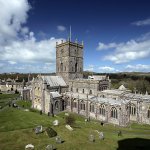
The Church, despite some conformity as to dates, was still the Celtic Christian model. By 1100 it had only three bishops at Bangor, St. David’s & Llandaff.
As an ordinary person you probably didn’t much care about all that – just attended your local church & took what strength & comfort from it you could.
You were used to priests being married with children, part of the wider ‘family’ & their children able to inherit their positions. You also took comfort from the presence of the communities of holy monks in round clasau, following directly in the tradition of the Saints.
In return for loyalty, dues, service the lord was supposed to protect you & yours, ensure the laws were followed, that your life was at least as safe as possible – while the church looked after your spiritual needs/moral behaviour on this Earth & your immortal soul.
Church & society knitted together: the church celebrated Grace & Nature as good gifts from God & recognised the sacredness of all creation. It was steeped in mysticism & poetry & included women in its leadership. It’s priests were married just like you.
It aligned well with a society that was rural, rooted in oral traditions of history, poetry & myth, family-based & still essentially ‘tribal’ in nature.
Hard to imagine now but though there were Irish incomers & contact with Danes on the southern sea trading route, it was a pretty tight, heterogeneous society – not perfect, riven by clashes as above – but people would have felt a very strong personal & communal identity, bound by history & culture, poetry & myth, language & law.
They would have struggled even to imagine it could be threatened, even perhaps destroyed.
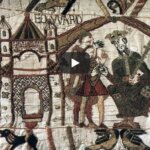
So when the Normans came, the shock was seismic: not just a raiding force this but a military machine mowing down warriors of a different kind, who had no battle tactics, machines of war or strategy to withstand such an onslaught. With few exceptions it relegated native warriors to raiding & guerilla warfare.
The Normans like the Romans quickly imposed their own systems & customs on all people under their rule, including the idea of towns & all that ‘civilisation’ brought with it – as colonisers they saw themselves & their systems as very superior.
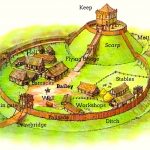
As the Romans built forts, the Normans built very strong wood & earthen castles incredibly fast; they had skilled, highly trained builders & warriors, efficient administrators & a different kind of church structure, also highly organised, which belonged to the Roman Catholic tradition under the Pope.
They were in short highly focused & relentless – & wanted to forge any conquests into subservient, profit making enterprises. Attention to detail was awesome: William I had the Domesday Book compiled in England & parts of Wales to know every detail of what he owned – only then could he confidently make grants to followers & know exactly what he & they held.
The Normans had the one Duke then King & all knights owed their land & positions to him, providing him with an army when needed. The Normans had their own laws & attitudes to women – they ran households & had children or were servants – & saw the Welsh as immoral, barbarous & inferior.
As Welsh lords were beaten back into core territories or Welshries, in the south & SW Marcher Lords took over with special powers: they became kings locally & could form an army, hold a court, exact taxes, execute rebels, do as they pleased as long as it didn’t infringe on the King’s position.
Imagine the feeling as an ordinary person as these metal-clad pointy-helmeted warriors thundered in & took over violently & ruthlessly – & it’s not a raid, they don’t go away!
You don’t understand their language but they can change everything as your lord has had to retreat & left you vulnerable. Resistance is futile: you must submit – unless you’re a young man & can run to where your lord is to fight for him.
Even the comfort of your centuries old church traditions is taken away, married priests banished (in very remote areas they cling on!) & a new system introduced you hardly recognise. Efficient as the Norman warriors & administrators, it ruthlessly exacts taxes – a 10th of income or produce … it’s extortionate! The Normans seem to see everything as a money making business!
Some of you, the poorest & most vulnerable, will be forced to work ceaselessly in fields & labouring jobs of all kinds. Those who try to continue to farm or trade are harried by the invaders & often their land taken or they are replaced by imported English & later Flemish traders/settlers.
So in Gower arises a culture of suppression & cacophony of languages & cultures: Norman, English, Breton, later Flemish. The incomers aggressively disrupt your society & disrespect you: how can foreigners so quickly make you the stranger in your own land??
New odd looking churches built on your old beloved monastic sites: parishes formed; dioceses defined; different orders of monks introduced from Europe, a different set of laws – all alien.
And everything has to be written down, boundaries drawn at their will, people organised into new types of maenors called demesnes, each under a knight responsible to the Marcher Lord at Swansea.

In a horrible irony your people suffer appallingly as your own Welsh lords begin to attack the invaders’ castles. In the mayhem people are burned, killed, injured, abused, left landless, homeless & with no choices. Welsh rebels are executed if caught – & an added cruelty is a family member has to hang them!
Nothing has stayed the same & even the familiar landscape is now littered with their castles & churches & style of farming. It’s true some in the remoter northern marsh areas manage to carry on much as before (the marshes aren’t worth the taking) but they are few. From now on, there will be a fairly clear divide.
Meanwhile, something amazing & frightening is happening: the most impressive castle has gone up in Swanzey, once the Danish trading post by the river.
It’s to be their HQ & will withstand several attacks to grow & form the nucleus of a town. You’ve always known small settlements, Trefi, but you can tell the Normans intend to grow this place: it’s like one huge fort with walls of wood, gates, towers & they enclose the castle & the settlement around it.
People say neat rows of strange-looking high dwellings for the foreigners are being built inside! You hear no Welsh in there: you would be the foreigner. Normans are peculiar & everything is ordered in rows – in battle, their soldiers, in the town their houses & in the country their fields.
They will have markets & need supplies in this town but any native Welsh who try to sell there will be searched as suspicious characters & allowed in or not at their will. No doubt they will ensure everyone pays any dues at the gate, market & coming in & out of the landing places on the river!
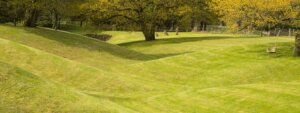
The Lords of Gower, their family & men will even eventually hunt in Parc le Breos, a large hunting preserve: Welsh lords were never allowed to do that, cutting off people from stepping on or hunting in the land of their fathers!
The Normans kill you if you do: their laws are far harsher than King Hywel’s & eventually as they rebuild their castles in stone the fightbacks & attacks lessen. Welsh Princes marry Norman ladies & Welsh princesses like the beautiful Nest marry Norman nobles. It’s more peaceful if not entirely so – but everything in Swansea & Gower will for centuries be done at their will & pleasure!
 Ann Marie Thomas is the author of five medieval history books, a surprisingly cheerful poetry collection about her 2010 stroke, and the science fiction series Flight of the Kestrel, Intruders, Alien Secrets & Crisis of Conscience are out now Follow her at http://eepurl.com/bbOsyz
Ann Marie Thomas is the author of five medieval history books, a surprisingly cheerful poetry collection about her 2010 stroke, and the science fiction series Flight of the Kestrel, Intruders, Alien Secrets & Crisis of Conscience are out now Follow her at http://eepurl.com/bbOsyz